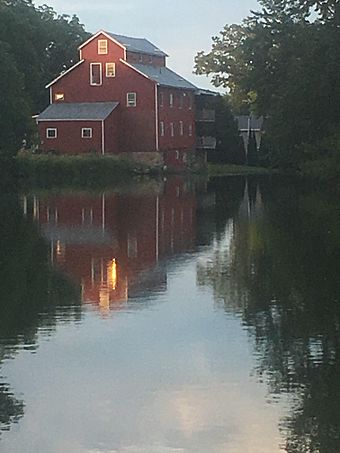Rhodes Mill facts for kids
Quick facts for kids |
|
|
Rhodes Mill
|
|
 |
|
| Location | Main St. Fertile, Iowa |
|---|---|
| Area | less than one acre |
| Built | 1868 |
| Architect | William Rhodes |
| NRHP reference No. | 78001274 |
| Added to NRHP | November 24, 1978 |
Rhodes Mill is an old building in Fertile, Iowa, USA. It is a special place because it shows us how people lived and worked long ago. This mill was added to the National Register of Historic Places in 1978. This means it is recognized as an important historical site.
Contents
The Story of Rhodes Mill
The story of Rhodes Mill begins with a man named William Rhodes. He moved to Fertile Township in Worth County, Iowa in 1856. He came all the way from Ontario, Canada.
Building the First Mill
In 1857, William Rhodes built his first mill. It was a saw mill, which cuts logs into lumber. This mill was built right next to the Winnebago River.
A Soldier's Return
During the American Civil War, William Rhodes joined the army. He served in the 32nd Iowa Infantry. After the war ended, he came back home in 1865.
A Town Grows Around the Mill
When William Rhodes returned, the town of Fertile started to grow around his mill. After the Civil War, farmers in Iowa grew a lot more wheat. This meant there was a big need for a flour mill. A flour mill grinds wheat into flour for making bread and other foods.
The Flour Mill is Built
In 1868, William Rhodes built a new flour mill. It was on the same spot as his old saw mill. This new mill could make 50 barrels of flour every single day! William and his son worked together in the mill business until 1918.
What the Mill Looks Like
The Rhodes Mill building is two and a half stories tall. It is made of wood and sits on a stone foundation. When it was first built, the mill was about 42 feet long and 34 feet wide.
Changes Over Time
Later, the mill was made longer, reaching 56 feet. A two-story living space was added to the building. In 1919, a small shed was built next to the mill. A strong concrete dam was also built across the river in 1929. This dam helped control the water flow for the mill.



